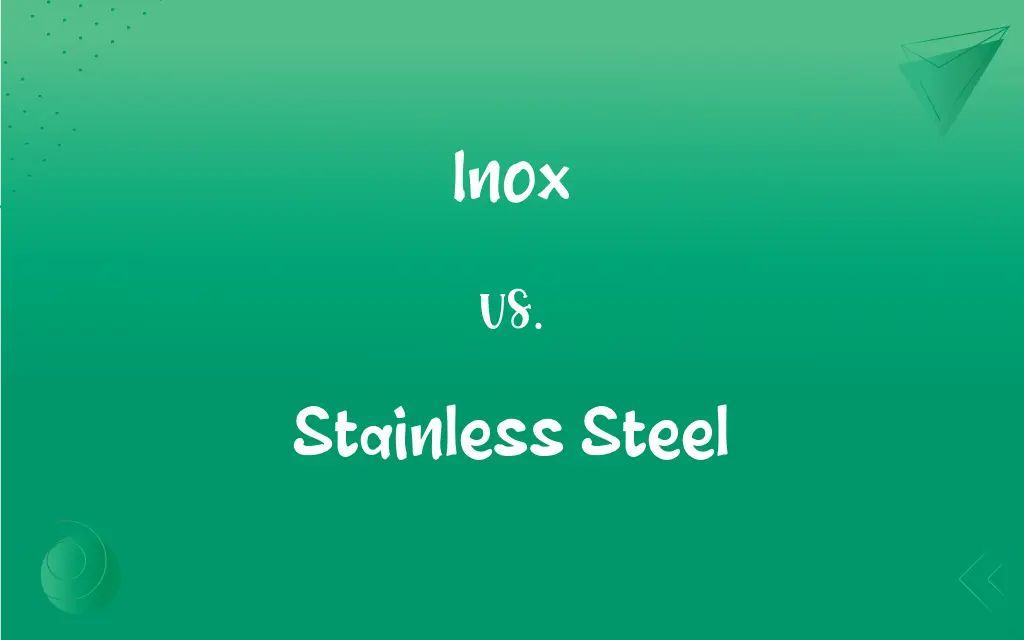Inox vs. Stainless Steel: What's the Difference?
Edited by Aimie Carlson || By Janet White || Published on November 16, 2023
"Inox" is short for "inoxidable," the French term for stainless, while "Stainless Steel" is an alloy resistant to corrosion, primarily due to its chromium content.

Key Differences
"Inox" is an abbreviation derived from the French word "inoxidable," which means non-oxidizable or stainless. On the other hand, "Stainless Steel" is a term commonly used in English-speaking countries to describe a range of steel alloys that resist rusting and corrosion.
At its core, Inox and Stainless Steel refer to the same type of material, known for its anti-corrosive properties. The distinction arises primarily from linguistic and regional preferences rather than any substantial difference in the material itself.
The term "Inox" is more commonly found in European contexts or products, particularly in regions where Romance languages are prevalent. "Stainless Steel," however, is predominantly used in English-speaking countries, ensuring clarity and understanding for those audiences.
Both Inox and Stainless Steel are prized for their resistance to rust, made possible by the inclusion of chromium. Typically, for steel to be considered stainless or "inoxidable," it must have at least 10.5% chromium content, which forms a passive layer on the surface, protecting the metal beneath.
When selecting materials for specific applications, whether labeled as Inox or Stainless Steel, it's crucial to consider the composition and properties of the material. While the names may differ, the inherent qualities of corrosion resistance and durability remain consistent between the two.
ADVERTISEMENT
Comparison Chart
Origin of Term
Derived from French "inoxidable."
English term describing the metal's resistance to corrosion.
Linguistic Usage
Commonly used in regions with Romance languages.
Predominantly used in English-speaking countries.
Material Composition
Steel alloy with a minimum of 10.5% chromium for corrosion resistance.
Steel alloy with chromium, enhancing its anti-corrosion properties.
Applications
Used in industries where corrosion resistance is vital.
Utilized in various industries, from cutlery to construction, due to its durability.
Symbolization
Symbolizes non-oxidizable material in certain regions.
Represents a strong, durable, and rust-resistant material worldwide.
ADVERTISEMENT
Inox and Stainless Steel Definitions
Inox
An abbreviation for the French term "inoxidable," indicating resistance to oxidation.
The chef preferred Inox knives for their durability and shine.
Stainless Steel
A corrosion-resistant steel alloy primarily containing chromium.
The Stainless Steel cutlery set retained its shine even after multiple washes.
Inox
A term predominantly used in European contexts to refer to stainless steel materials.
The Inox watch remained free of rust despite being exposed to moisture.
Stainless Steel
Steel that, due to its composition, resists staining or rusting.
The Stainless Steel appliances gave the kitchen a modern and clean appearance.
Inox
A term emphasizing the non-oxidizing properties of certain steel types.
The Inox fixtures in the bathroom showed no signs of rust.
Stainless Steel
Metal known for its anti-rusting properties.
Many chefs prefer Stainless Steel pans for their even heat distribution.
Inox
Steel alloyed with chromium to enhance its resistance to corrosion.
The Inox railing on the balcony maintained its appearance for years without tarnishing.
Stainless Steel
A common material in industries requiring durability and resistance to corrosion.
Stainless Steel surgical instruments are essential for maintaining sterility during procedures.
Inox
A synonym for stainless steel in specific linguistic contexts.
She bought an Inox kettle for its sleek design and longevity.
Stainless Steel
An alloy utilized for its strength and resistance to tarnishing.
The bridge was constructed using Stainless Steel for long-lasting durability.
Inox
(attributive) stainless steel
Inox steel
Stainless Steel
Alternative spelling of stainless steel
FAQs
In which regions is the term "Inox" more commonly used?
"Inox" is more commonly used in European contexts, especially in regions where Romance languages are prevalent.
What does "Inox" stand for?
"Inox" is an abbreviation for the French term "inoxidable," which means non-oxidizable or stainless.
Why is Stainless Steel resistant to rust?
Stainless Steel contains chromium, which forms a protective layer on the surface, preventing rust.
How can Stainless Steel be identified?
Stainless Steel can often be identified by its shine, resistance to rust, and sometimes through markers or stamps on products.
Do both Inox and Stainless Steel require special cleaning methods?
Generally, both can be cleaned with mild detergents; abrasive materials should be avoided to prevent scratches.
Is there a material difference between Inox and Stainless Steel?
No, both Inox and Stainless Steel refer to the same material known for its anti-corrosive properties.
Why is Stainless Steel used in kitchen appliances and utensils?
Stainless Steel is favored for its durability, resistance to corrosion, and aesthetic appeal.
What makes Stainless Steel "stainless"?
The chromium content in Stainless Steel forms a passive surface layer, preventing oxidation and staining.
Are Inox products exclusively made in Europe?
No, while "Inox" is a term often used in European contexts, products made of this material are manufactured worldwide.
Is all Stainless Steel magnetic?
Not all. While some grades of Stainless Steel are magnetic, others, like the 300 series, are not.
Is "Inox" a brand or a material type?
"Inox" is a term describing a material type, not a brand.
Are there different grades of Inox?
Yes, just as with Stainless Steel, there are different grades of Inox, each with varying compositions and properties.
How does Stainless Steel react to high temperatures?
Stainless Steel generally maintains its strength at high temperatures, though its corrosion resistance might be reduced at very high temperatures.
Can Inox and Stainless Steel be used interchangeably in product descriptions?
Yes, they can be used interchangeably, though it's essential to consider the target audience's familiarity with the terms.
How does Stainless Steel compare to regular steel in strength?
Stainless Steel generally offers similar strength to regular steel but with added corrosion resistance.
What industries commonly use Stainless Steel?
Stainless Steel is used across various industries, including kitchenware, construction, automotive, and medical sectors.
Is Inox suitable for outdoor use?
Yes, Inox is ideal for outdoor use due to its resistance to weather-related corrosion.
Why is Stainless Steel often used in medical instruments?
Stainless Steel's corrosion resistance, ease of sterilization, and durability make it ideal for medical instruments.
Can Inox be painted or colored?
Yes, with proper surface preparation, Inox can be painted, though its natural finish is often preferred.
Is there a cost difference between Inox and Stainless Steel products?
The material is essentially the same; any cost difference would be due to factors like brand, product design, or manufacturing quality.
About Author
Written by
Janet WhiteJanet White has been an esteemed writer and blogger for Difference Wiki. Holding a Master's degree in Science and Medical Journalism from the prestigious Boston University, she has consistently demonstrated her expertise and passion for her field. When she's not immersed in her work, Janet relishes her time exercising, delving into a good book, and cherishing moments with friends and family.
Edited by
Aimie CarlsonAimie Carlson, holding a master's degree in English literature, is a fervent English language enthusiast. She lends her writing talents to Difference Wiki, a prominent website that specializes in comparisons, offering readers insightful analyses that both captivate and inform.

































































